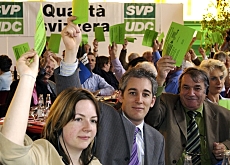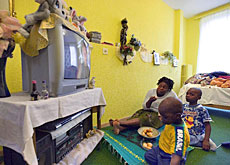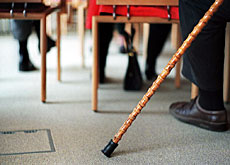People’s Party backs “integration contract”

The rightwing Swiss People's Party has announced plans to launch a people's initiative to make immigrants stick to Swiss laws or be expelled.
The 300 delegates at a party meeting in Lugano voted unanimously on Saturday in favour of an integration contract. In addition only one person voted against the fifth revision of invalidity benefits, which goes to the polls on June 17.
The final text of the initiative, entitled “Our rules count for everybody”, will be put to delegates at the party’s general assembly on June 30, but the gist of the motion is that if foreigners don’t stick to a “pledge of loyalty” to the Swiss constitution and legal system, they will be told to leave the country.
It also obliges immigrants to sign up – out of their own pocket – to integration courses, which will finish with a test. They will also have to learn one of Switzerland’s four national languages.
Whoever refuses such integration or violates Swiss laws will be forced to leave the country, according to the initiative, signatures for which could start being collected on August 1, Swiss National Day.
The People’s Party also proposed on Saturday that new arrivals in Switzerland should not receive any welfare benefits for their first five years in the country – “so we could get a better grip on immigration and the social system”, according to Zurich cantonal councillor Bruno Walliser.
Foreigners and crime
Justice Minister Christoph Blocher addressed the delegates in Lugano and continued the theme with his speech on “Criminality, Safety, Foreigners”.
The reputation of Swiss youngsters has taken a battering over the past year with several high-profile allegations of rape involving youths. On Saturday Blocher described many of those involved as “badly integrated foreigners, especially from the Balkans”.
A survey published in January showed that most Swiss were in favour of cracking down on youth violence.
Blocher said he favoured an increased police presence at problem schools and that parents had to take their duties seriously, even suggesting a tightening of civil law in cases where parents neglected elementary child-rearing duties.
As well as calling for better cooperation between the various authorities, Blocher wanted trials involving criminals to be sped up. “Youngsters must be sanctioned for any crimes as quickly as possible,” he said.
Disability benefits
The other main topic on Saturday was invalidity benefits. The political right is calling for a stop to what it describes as system abuses.
Government reforms of the invalidity-benefit system aim to cut spending and bring the scheme back from the brink of collapse.
The People’s Party had criticised previous amendments as being too weak. It said the perceived abuses of the social security system could only be stopped by tougher measures.
The fifth draft of the reforms goes to Swiss voters on June 17.
swissinfo with agencies
The state invalidity benefit scheme was set up in 1959. It is mandatory for all residents in Switzerland who are gainfully employed.
The scheme is financed by a 1.4% deduction from salaries. The federal authorities provide additional funding.
The insurance system has been in the red since the beginning of the 1990s. The number of benefit claimants has increased as a result of more people suffering from mental illnesses and work-related stress.
In May 2004 voters rejected plans for a one-per-cent hike in value added tax to fund the invalidity scheme.
The Swiss People’s Party was founded in 1936.
It has 59,000 members, of which a third is female.
It has 55 seats in the 200-seat House of Representatives and 8 seats in the 46-seat Senate.
The party chairman is Ueli Maurer.
A government party is a party with at least one seat in the Swiss seven-strong government.
Since 1959 the parties have been: Christian Democrats, Social Democrats, Radical Party and Swiss People’s Party.
Until 2003 all the parties except the People’s Party had two seats (magic formula). The People’s Party then won a second seat at the expense of the Christian Democrats, reflecting the fact it had become more popular with the electorate.

In compliance with the JTI standards
More: SWI swissinfo.ch certified by the Journalism Trust Initiative



You can find an overview of ongoing debates with our journalists here. Please join us!
If you want to start a conversation about a topic raised in this article or want to report factual errors, email us at english@swissinfo.ch.